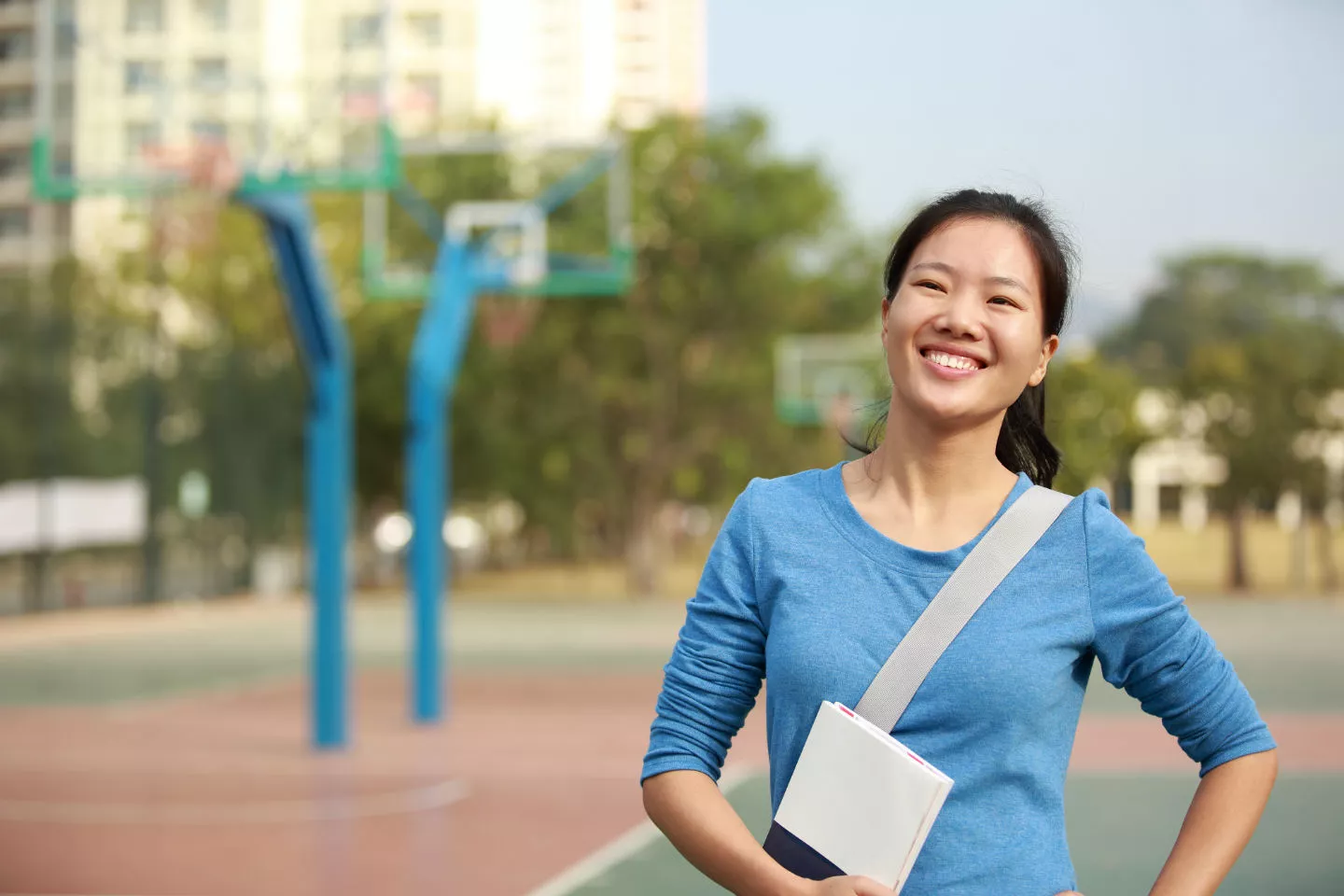9 research findings that show why education needs sport

Richard Bailey of the International Council of Sport Science and Physical Education tells us why there’s more to sport than just play
For many people, sport and education stand in stark opposition to each other. One is trivial, the other serious. One is about play, the other about work. This divide, which has its roots in Europe’s historical and philosophical past, can be seen clearly in education, where sport (and its educational representative, Physical Education) are frequently given low status, limited curriculum time and inadequate resources. For many parents, sport and other organised forms of physical activity ought to take a more and more marginal position within education as their children get older in order to let them focus on the ‘real business’ of school, which is to help them go on vocational training, higher education, or to work.
Over time, these attitudes have started to change, although change has sometimes been painfully slow. The emergence of the so-called ‘physical inactivity pandemic’ has clearly played a role in sport’s changing fortunes. As activity levels continue to drop, rates of non-communicable diseases go up. Sport, as the most popular, palatable form of physical activity for many people, has moved towards the centre of public health policy and practice, as cheap medicine. At the same time, there has been an acknowledgement of the significant financial contribution that sport, in its different forms, makes. Sport is a large and rapidly growing sector within the European economy, accounting for about 3% of Europe’s total GDP and about 3.5% of employment in the EU. Adult education has responded to this situation with the development of more and increasingly specialised pathways, from teachers and coaches, to the sport goods industry, to sports media and broadcasting.
There is another aspect of the relationship between sport and education, too, and developments in scientific research have only recently highlighted it fully. Evidence from educational research, psychology, the neurosciences and other disciplines is starting to show that the traditional opposition between education and sport is simply mistaken, and that - far from interfering with the business of education - sport can actually make a valuable contribution to it.
To explain this bold claim, I offer nine findings from research into the effects of sport and physical activity that show that activity - in addition to its well-known virtues of keeping bodies fit and healthy, adds enormous value to education.
1. Improve brain wiring
Sport and physical activity 'nourish' the brain, helping it work grow and operate effectively. It has been shown that physical activity leads to profound and long-lasting changes in brain wiring, and these developments directly enhance intellectual work.
2. Boost memory
Sport and physical activity can improve learning and memory. Learners with a good memory and the ability to learn quickly have a considerable advantage which will influence almost every aspect of their experiences of adult education and beyond.
3. Better concentration and focus
Even short bouts of a few minutes of sport and physical activity can lead to improved concentration and attention, which directly effects how people learn and retain information.
4. Help with numeracy and literacy
Numeracy and literacy performance especially improve as a result of increasing levels of physical activity among younger students.
5. Improve mental wellbeing
Regular exercise can alleviate depression and anxiety, which can be particular cause for concern during adult education.
6. Foster inclusion
Institution-based sports and other physical activities are particularly valuable at creating a sense of belonging and commitment, and can help potentially marginalised students feel included and accepted.
7. Boost academic performance
Physically active people perform better academically then their inactive peers, and those who are most active benefit the most.
8. Strengthen motivation
Physically active students tend to have more qualifications, engage in further study, have an improved chances of securing a good job, and even tend to get promoted more quickly.
9. Improve employability
Physically active individuals are seen by employers as healthier, more efficient, and more reliable. So active people are more employable.
Not all sporting experiences are positive, of course, and bad sports teaching and coaching can sometimes be worse than nothing at all. So it is worthwhile students investing some time in finding the best type of sport or activity for them and the demands of their lives. But appropriately presented activities that take place in a positive and supportive environment can be inspiration.
So perhaps it is time for educational institutions and their students to think again about their presumptions about the role of sport and physical activity? Far from being fun trivialities, or distractions from the main business of education, the evidence suggests that sport and physical activity can make valuable, distinctive contributions.

| Richard Bailey is a former teacher in Primary and Secondary Schools, teacher trainer, coach and coach educator. In addition to his position as Writer in Residence at the ICSSPE (International Council of Sport Science and Physical Education) Executive Office he is an author and blogger. He has worked with UNESCO as Expert Adviser for Physical Education, the World Health Organization, the European Union, and many similar agencies. He was a contributing consultant for both Nike-led Designed to Move and Active Kids Do Better initiatives, and has directed numerous scientific reviews. |
Komentar
Sports+izglītība = nākotne
Paldies raksta autoram par šī jautājuma aktualizēšanu!
Nodalījums sports un izglītība, manā skatījumā, jau sen ir zaudējis savu līdzšinējo nodalījumu. Mūsdienās jebkuram skaidri domājošam cilvēkam ir skaidrs, ka sports ir nozīmīga izglītības daļa, un tāpat, izglītība ir nepieciešama sportiskajiem sasniegumiem.
Savā ģimenē esmu redzējusi, kā uz bērniem "iedarbojas" dalība Latvijas Olimpiskās komitejas projektā "Sporto visa klase". Manuprāt, šim projektam ir lielisks mērķis, kas vienlaicīgi liek bērniem cīnīties par rezultātiem sporta spēlēs, bet tajā pašā laikā, viņi saprot, ka nevienai uzvarai nav būtiskas nozīmes, ja klases vidējās sekmes nav atbilstošā līmenī. Tas jau no mazām dienām iemāca bērniem, cīņas sparu, apņēmību, sadarbības prasmes un mērķtiecību.
Caur sportu mēs bērniem mācām domāt, analizēt un plānot, un šīs apgūtās prasmes viņi pratīs pielietot arī citās mācību un dzīves jomās.
Tikai kombinācija izglītība + sports palīdz veidot aktīvu, uzņēmīgu un izglītotu jauno paaudzi.
Izglītība nav iespējama bez sporta
Niby sport w pewien sposób
Fizisko aktivitātāšu nozīmīgums
Walk and Talk
Powyższy tekst przypomniał mi o idei walk and talk polegającej na organizowaniu spotkań biznesowych podczas spacerów. Moda na chodzone spotkania biznesowe, mocno rozprzestrzeniająca się za przyczyną takich propagatorów jak menedżerowie z Doliny Krzemowej (m.in. Steve Jobs, Mark Zuckerberg, Jack Dorsey) czy prezydent Barack Obama, jest coraz bardziej popularna również w Polsce. Tym bardziej, że - obok takich zalet formuły jak łatwiejsze przełamanie lodów, możliwość zrelaksowania się i zachowania koleżeńskich stosunków między członkami zespołu i przede wszystkim zwiększona kreatywność - stawia się ją w opozycji wobec tzw. palenia naszych czasów, czyli siedzenia. W zakresie weryfikacji wspomnianego pobudzania kreatywności poprzez chodzenie odsyłam do badań Marily Oppezzo i Daniela L. Schwartza z University of Stanford, Give Your Ideas Some Legs: The Positive Effect of Walking on Creative Thinking i... zachęcam do ćwiczeń praktycznych.
Piekrītu, ka šī ir ļoti
Piekrītu, ka šī ir ļoti apspriesta tēma jau gadu gadiem, un cik cilvēku, tik
viedokļu. Arī no savas pieredzes varu teikt, ka daļai skolēnu sports bija
mīļākais mācību priekšmets, bet daudzi skolēni nāca uz sporta stundām ar ārsta
zīmēm un sēdēja malā.
Es tomēr piekritīšu tam, ka sporta aktivitātes mums ir nepieciešamas un jo
vairāk, jo labāk. Raksta autore ir precīzi uzsvērusi svarīgus secinājumus, par sporta
pozitīvo ietekmi uz cilvēka organismu un darba spējām. Mūsdienās mēs ļoti daudz
laika pavadam pie datora vai mobilā telefona, daudz pārvietojamies ar
automašīnām u.t.t. Tāpēc mūsu organismi dažreiz pat “prasās” pēc fiziskajām
aktivitātēm. Nevajag ignorēt šos signālus, jo bieži vien tas var novest pie
nopietnām veselības problēmām. Nav noslēpums, ka arī mūsdienu jaunatnei ir
lielākas problēmas ar lieko svaru, jo ir mazkustīgs dzīvesveids. Apkopojot šos
visus faktus, uzskatu, ka fiziskās aktivitātes skolās būtu tikai jāpalielina,
taču varētu padomāt par vērtēšanu, jo bieži vien tas ir iemesls, kāpēc skolēni
izvēlas neiet uz sporta stundu- nevēlas saņemt sliktu atzīmi.
Zgadzam się, że być może
Zgadzam się, że być może wiele osób nie docenia tzw. sportu rekreacyjnego, jednakże każdy kto ma do czynienia z edukacją dorosłych i andragogiką wie, że do normalnego rozwoju uprawianie aktywności fizycznej jest niezbędne w każdym wieku. Widać to po zmieniającym się stylu życia. Odnoszę wrażenie, że określone w artykule "tradycyjne" przeciwstawienie sportu i edukacji odchodzi coraz bardziej w przeszłość. Dobrze, że autor wspomina o badaniach naukowych- generalnie ostatnio prowadzone badania właśnie wskazują na związki między umiarkowaną aktywnością fizyczną a wydajnością mózgu.
Moim zdaniem największe niebezpieczeństwo dla sportu rekreacyjnego stanowi eksploatacja organizmu w pracy. Praca w XX wieku staje się coraz bardziej przeintelektualizowana i absorbująca. Łatwo się zatracić w obowiązkach zapominając o kulturze fizycznej. Przykurcze, skoliozy, nerwobóle (jak rwa kulszowa) biorą się właśnie z takiej wielogodzinnej pracy "przy biurku". Edukacja w miejscu pracy powinna moim zdaniem zawsze brać pod uwagę problem ergonomiczności, który ściśle wiąże poniekąd się z propagowaniem sportu rekreacyjnego, jako przeciwdziałającego wymienionym wcześniej dysfunkcjom organizmu. Przy rozsądnym podejściu nie będzie miejsca na omawiany w artykule dysonanas.
tõlge ja sisu
Väga hea sisuga ja natuke kesisevõitu tõlkega artikkel.
Mind huvitab see teema väga ja seda nii üldisest kui isiklikust vaatenurgast. Hea on teada, kuias saab toetada inimese õppimist muuhulgas ka füüsilise tegevuse kaudu.
Thanks
Ir daudz dzirdētu komentāru
Täname, Riina, et
Täname, Riina, et tõlkevigadele tähelepanu pöörasid. Vaatame teksti üle ning teeme vajalikud parandused.





Sports un izglītība.
Šis raksts ļoti veiksmīgi atklāj diskusiju par sporta un izglītības savstarpējo saistību, izceļot tos daudzveidīgos veidus, kādos sports var ietekmēt cilvēka attīstību gan fiziski, gan intelektuāli. Tas akcentē to, ka tradicionālais skatījums uz sportu kā tikai izklaides vai atpūtas veidu būtu jāmaina.
Manuprāt, norādījums par sporta ietekmi uz smadzeņu darbību un intelektuālo attīstību atspoguļo zinātniski pierādītus faktus, kas liecina par to, ka sports nav tikai fiziska aktivitāte, bet arī ietekmē cilvēka prāta spējas. Un secinājumi par sporta pozitīvo ietekmi uz izglītību un darbaspēku ir ļoti spēcīgi argumentēti, izmantojot pētījumu rezultātus. Tas var iedrošināt sabiedrību un izglītības iestādes vairāk iekļaut sportu izglītības procesā kā nozīmīgu komponenti, ne tikai fiziskās veselības, bet arī intelektuālās attīstības labā.
Sports var būt daudz vairāk nekā tikai fiziska aktivitāte, būtisks elements cilvēka attīstībā, atbalstot gan fizisko veselību, gan intelektuālo izaugsmi.